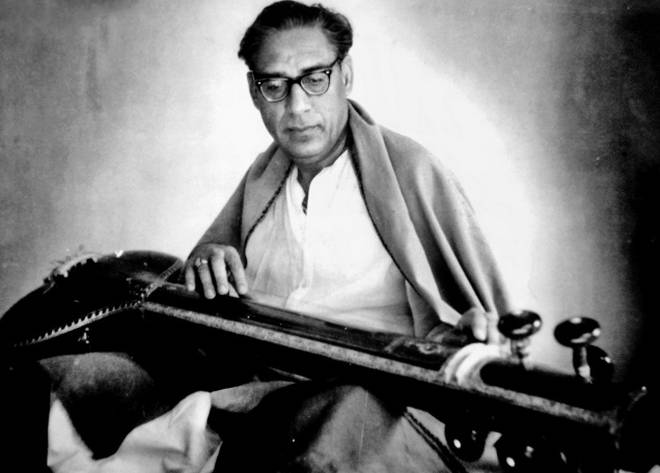Indore, MADHYA PRADESH / Kolkata, WEST BENGAL :

As the late Ustad Amir Khan’s magic continues to awe listeners, various musicians claim that he was from their gharana.
Ustad Amir Khan (born on August 15) was an introvert and a man of few words, yet Khan saheb had validated during an exhaustive interview for a documentary film on him by the Films Division, “Mai Indore (gharane) ke naam se gaa raha hoon.” (I am singing under the identity of Indore gharana.)
Obviously, his unique style took a tangible, modern form very gradually; turned his listeners around as gradually and became a rage, specially in Bengal. Generations of most eminent musicians came under his majestic charm.
On a more formal ground, his disciples like Pandit Amarnath, Pandit A. Kanan, Pandit Tejpal Singh and several others also had established themselves not only as performers but also as revered gurus.
Under the circumstances, the “three-generation” stipulation too was met during Amir Khan saheb’s lifetime that was crudely cut short by a horrible car accident when he was barely 62 and at the peak of his career.
Since his magic refuses to spare sensitive souls even now, several gharanedar musicians are screaming foul and claim Ustad Amir Khan as one of them.
Ironically no other gharana faces such sharp controversy; rife with appalling stories!
But a large number of musicians, in their pursuit to serve the cause of good music, do not care to indulge in such tactical claims to attest their blue blood. Moreover, the modern era is open to different ideas, irrespective of their origin or lineage. For example, I noticed a marked change in Pandit Ulhas Kashalkar’s singing around 1998. The pristine style of this top ranking khayal exponent, equally adept at handling three major styles, was suddenly steeped in soulful depths of a slower than usual Gwalior, Jaipur or Agra pace that usually floats around medium tempo.
Asked why, Kashalkar’s answer was simple, “Everybody is singing that way here (in Bengal) and it facilitates space for more emotions.” But this was actually a slow process initiated by Ustad Vilayat Khan.
For his 75th birthday celebration his ardent fan, Jayant Chatterjee had roped in Kashalkar to sing the legendary sitar maestro’s khayal and thumri compositions.
Hailed as “Amir Khan on the sitar”, the Ustad was very close to Khan saheb who was his elder sister’s husband but things soured later.
In “Komal Gandhar” (his autobiography, compiled by Shankarlal Bhattacharya; translated by me from Bengali to Hindi; published by Kanishka, Delhi), Ustad Vilayat Khan admitted to have “spent hours of riyaz together” with Khan saheb. A photograph adorning the living room of Maharaj Banerjee, a renowned but retired harmonium player, bears testimony to this fact.
Amir Khan (born 1912) and Vilayat Khan (born 1928) doing ‘riyaz together’ leaves a lot left unspoken. So does Ustad Vilayat Khan’s indelible impression on Kashalkar’s psyche. And what a wonderful result it has yielded ever since! Furthermore, Pandit Vijay Kichlu, the erudite founder-director of ITC Sangeet Research Academy, who actually was behind the phenomenal rise of the Academy’s young students, including Rashid Khan, gave a memorable introduction while presenting him during a Sangeet Ashram event on August 10th 2007. The date signifies that it was close to Khan saheb’s birthday and the introduction, abounding with audio-clips, significantly highlighted his deep imprint on Ustad Rashid Khan’s musical thoughts.
Pandit Buddhadev Dasgupta, veteran sarod maestro and an erudite analyst, also says that this extremely popular khayal singer with a golden voice is deeply influenced by Amir Khan’s music. So is young Arshad Ali Khan of Kirana gharana. They are not isolated cases. The list of Ustad Amir Khan’s followers or admirers is pretty impressive. Some greats, like Vidushi Kishori Amonkar and Ustad Shujaat Khan have openly admitted Khan saheb’s influence on their music.
Even four decades after his untimely demise, there are many such eminent musicians who avoid confessing his impact but their music reveals Khan saheb’s indelible stamp loud and clear. This style’s unmatched popularity had transcended all barriers during the short life-span of its creator. Moreover his disciples are carrying forward the legacy steeped in ‘abstract’ modernism. Eminent musicologist-author Vamanrao Deshpande saw this coming. He, therefore, acknowledged Indore as an independent Gharana in his book “Gharandaj Gayaki” (Marathi, published in 1961); and rightly so.
source: http://www.thehindu.com / The Hindu / Home> Friday Review / by Meena Banerjee / August 13th, 2015








